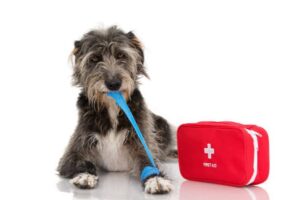Pet First Aid
Our furry companions bring so much joy into our lives, but sometimes, accidents happen. Being prepared for a pet emergency can mean the difference between getting your loved one the care they need quickly and waiting helplessly. Learning pet first-aid is a must for a pet parent.

Just like having a first-aid kit for yourself, assembling a pet’s first-aid kit empowers you to address minor injuries and stabilize your pet until veterinary help arrives. The blog has the necessary information on pet first-aid that you need to know.
Why You Need a Pet First-Aid Kit:
Imagine this: you’re out for a walk with your dog when they step on a broken piece of glass. Or, you hear a yelp from your cat that got into something they shouldn’t have. A pet first-aid kit equips you to handle these situations calmly and effectively. Here’s what a well-stocked kit lets you do:
- Treat minor wounds: Clean cuts, scrapes, and minor burns can be addressed with basic supplies.
- Stop bleeding: Apply pressure and use styptic powder to manage minor bleeding.
- Ease discomfort: Give your pet a pet-safe pain reliever (always consult your vet first!) to ease their discomfort until you reach the vet.
- Prevent infection: Clean wounds and keep them covered to prevent infections.
- Stay calm and reduce your pet’s anxiety: Knowing you’re prepared can keep you calm during a stressful situation, which can also help keep your pet calmer.

Building Your Pet First-Aid Kit:
Stock your pet first-aid kit with these essential items:
- Wound care supplies: Absorbent gauze pads, non-stick bandages, self-adhering wraps, adhesive tape, cotton balls, blunt-tipped scissors, tweezers (for removing splinters), antiseptic wipes or saline solution.
- Eye care: Preservative-free saline eye wash.
- Medications (with vet approval): Diphenhydramine (Benadryl) for allergic reactions (consult dosage with your vet beforehand!), Styptic powder for minor bleeding.
- Other essentials: Rectal thermometer, disposable gloves, pet-safe pain reliever (consult your vet for dosage), ice pack (improvise with a sealed bag of frozen vegetables wrapped in a towel), flashlight, towels, blanket, vomit bag, printed copy of your pet’s medical records and veterinarian contact information.
Remember:
- Talk to your veterinarian before adding any medications to your kit and ensure you understand the proper dosage for your pet.
- Label everything clearly and keep the kit in a cool, dry, and easily accessible location.
- Take a pet first-aid course to learn basic first-aid techniques for animals.
Level up your pet’s wellness!
Animal Hospital of Aurora dives deeper than playtime and cuddles. Our veterinarian all-stars know that perfect nutrition fuels pet happiness. We’ll craft a personalized plan, from food recommendations to regular checkups, to keep your furry friend thriving. Partner with us to unlock your pet’s full potential for health and happiness!
Conclusion:
By having a pet first-aid kit and familiarizing yourself with basic first-aid procedures, you can ensure your furry friend receives prompt and effective care during an emergency. In other words, a prepared pet owner is a calm and confident pet owner, and that can make all the difference in a critical situation.



